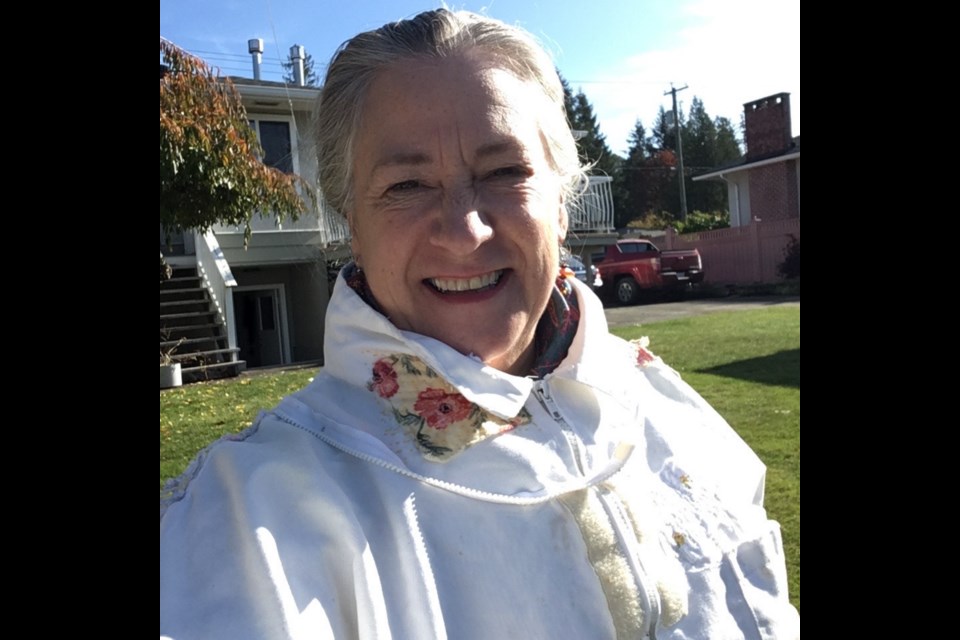More than 100 years ago the government of British Columbia and the British Columbia Honey Producers Association (BCHPA) made a partnership proclamation that stated:
“Honeybees and native pollinators play a key role in sustaining a healthy environment enjoyed by all British Columbians; and honeybees fulfill a critical role in British Columbia’s agricultural sector through the pollination of crops and flowering plants, and to [ensure the protection and sustainability of the province’s honeybee population].”
Unlike provinces such as Ontario, which have honey producers working with thousands of bee colonies, producing massive amounts of honey, BC is unique in that most of the honey produced here is by small backyard bee apiaries.
Local qathet region beemaster and provincially certified honey judge Donna Moseanko has been raising bees [specifically queen bees] for eight years and selling products from her hives for seven years, called Wildwood Queens. She believes bees play an important role in maintaining healthy ecosystems; especially important are healthy queen bees.
Her father kept bees and thus, was a big influence on her decision to become a beekeeper.
“It was a warm day in May, around my father’s birthday, and we [her family] were in the backyard having dinner, and I became mesmerized by a swarm of bees,” said Moseanko. “I looked at the swarm hanging from the tree, and everything else just [seemed] disappeared at that moment.”
Another special and important moment she had with bees was when she was helping another beekeeper in Port Hardy make it through the honey season, because of an injury they had.
“I was out in the forest where the fireweed was in the early evening, working with the bees, when all of a sudden the bees went quiet,” said Moseanko. “All the bees had come home and went into their boxes.”
Now Moseanko has 13 apiaries in the qathet region with 50 bee colonies, including Westview, Wildwood, Cranberry, and south and north of town. Surprisingly, bees do well in more urban areas such as Westview, and the honey will taste like whatever [the bees] are gathering within three-miles, according to Moseanko.
“People water gardens and fruit trees, and [bees] do well in town, because of watering, it encourages them to make nectar, and it’s a different kind of climate,” she said.
She mentioned that “local honey will be from florals and local pollen; the flavour is different depending on the location.”
“I’ve got buckwheat flowers up at Blueberry Commons, so the honey will have a buckwheat taste. People can taste the differences, even going south and north of town, people can taste the difference.”
The honey sold in big box stores comes mainly from Ontario, where bees are pollinating canola plants, which isn’t necessarily a bad thing, as those big buyers support large bee colonies and the producers there, she added.
Moseanko is a master beekeeper, and also recognized for raising local queen bees.
“I send them out all over the province and country,” she said. “She [queen bee] holds the hive together with her pheromones and she’s the egg layer. If she wasn’t there, the hive wouldn’t function; the bees wouldn’t have direction or purpose.”
Although humans have [and still] collect honey from wild bees, beekeeping in pottery containers began 9,000 years ago. Farmers since prehistoric times have worked with bees in order to benefit from all the nutritious qualities in the products the bees make.
“Honey with pollen is highly nutritious,” said Moseanko. “When honey is capped by the bees with wax, they have reduced the moisture content and will preserve it; nothing will grow in it.”
Propolis, a gummy resin the bees gather has been used to treat sore throats in humans for centuries; it has antimicrobial and antifungal qualities.
“The bees use [resin] to plug up holes in the hive; in a natural [healthy] hive in a tree they would cover their whole hive in it,” said Moseanko. “The blackberry bloom is the biggest here and usually begins mid-July and goes to mid-August.”
She said the best thing about beekeeping is that it’s solitary and meditative.
“With experience, patience and gaining knowledge from different sources [other beekeepers and online resources], you get to a point where you can approach a hive, open it up and know what they need,” said Moseanko. “You are putting a wild insect in a box, and you are working to manage it, while it goes about its own business




